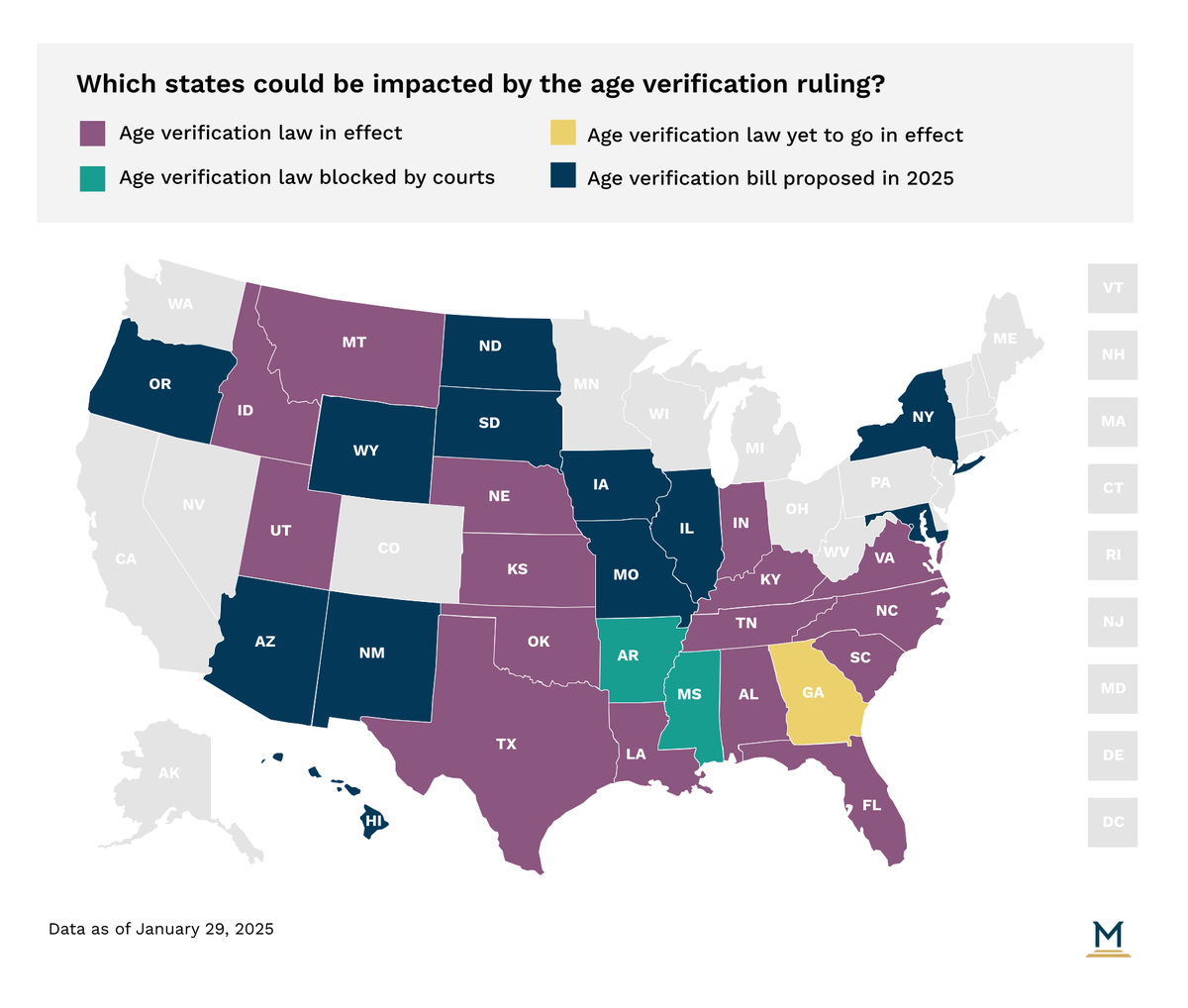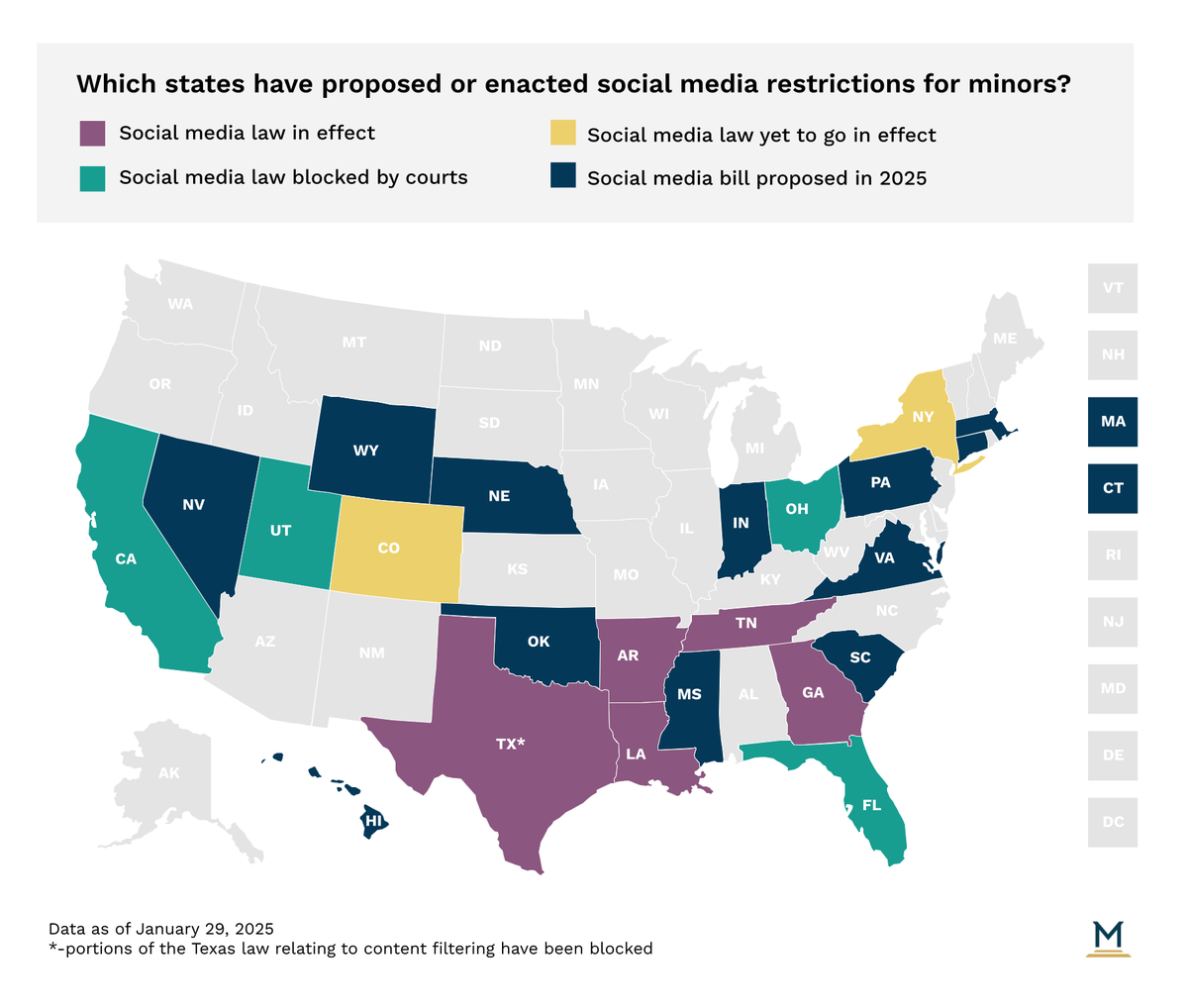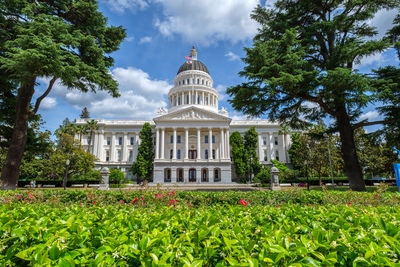
Technology & Privacy
How Trump's AI Executive Order Will Impact States
December 19, 2025 | Bill Kramer
February 5, 2025 | Max Rieper
-666769-1200px.jpeg)
Key Takeaways:
The U.S. Supreme Court recently heard oral arguments in a case challenging a law in Texas that would require age verification for websites containing adult content. The law, enacted in 2023, was blocked by a district court later that year, only for that injunction to be vacated by the Fifth Circuit last May.
Texas is now one of 17 states that require websites with adult content to verify the age of users to block minors, and if these laws are allowed to stand, more proposals could pass this session.
Generally, age verification laws apply only to websites where a substantial amount of content - usually defined as one-third - is materially harmful to minors. A law in Kansas lowers that threshold to 25 percent, while Tennessee requires just 10 percent of content to be materially harmful. However, there is ambiguity about how exactly the threshold is calculated. Statutes are generally silent as to whether the threshold refers to the number of images, minutes of video content, or size of the files. Websites could also try to evade regulation by posting volumes of benign content, although that loophole wouldn’t exist if content is defined as “views.”
Defining what is materially harmful is also a challenge, although most states define it as obscenity as defined by the Supreme Court in a 1973 case. The three-pronged Miller test from that case requires that the content appeals to a prurient interest applying contemporary community standards, depicts sexual conduct in a patently offensive way, and lacks serious literary, artistic, political, or scientific value. However, some statutes rely on definitions in older statutes on the distribution of obscene content that may be antiquated now. In Kansas, for example, any content depicting same-sex couples, even if non-sexual, might be considered materially harmful to minors.
The biggest question facing adult-content websites is how to verify the age of users. Most statutes call for "reasonable age verification methods" that include a government-issued identification checked against an image of the user, much like how age is verified for retailers in person. But some have argued this has a chilling effect on consumers.They may be wary of uploading personal information to an adult-content website for fear that information could be acquired by someone with nefarious intentions. In Utah, websites can verify age through third-party services that compare personal information to commercially available databases used by businesses and governments to verify ages. The Texas law allows verification through “any commercially reasonable method that relies on public or private transactional data.” Websites have expressed concerns about their ability to verify ages accurately with some deciding instead to block access to all users in certain states.
These laws have faced legal challenges on free speech grounds. Courts have evaluated laws regulated speech using “strict scrutiny” which requires the law to (1) serve a compelling governmental interest; and (2) be narrowly tailored to be the least restrictive means to achieve its purpose. But the Fifth Circuit held the Texas law need not face such a high standard, instead applying a “rational basis test”, only requiring the law advance a legitimate state interest with a rational connection to the law.
It is not just access to adult sites that lawmakers are trying to restrict for minors. Many bills have already been filed this year to require parental consent for minors to have social media accounts. Many of these proposals also require minor accounts to come with certain privacy features that prohibit the account from coming up in a search or being contacted by unlinked accounts, or have certain features turned off, such as auto-play, infinite scroll, targeted advertising, or push notifications. Many enacted laws have also faced legal challenges with courts blocking measures in Arkansas, California, Florida, Ohio, Utah, and parts of a Texas law on free speech grounds.
Other proposals would shift restrictions to app stores. Lawmakers in Alaska, Arizona, Hawaii, North Dakota Oklahoma, Oregon, South Carolina, South Dakota, and Utah have introduced bills similar to the App Store Accountability Act proposed in Congress last session. These measures, many of which were drafted by the Digital Progress Institute, would require an app store to verify a user's age and require parental consent for a minor to download, purchase, or use an app, or make in-app purchases. App stores would have to provide clear app age ratings if they are provided, and provide real-time notice to developers whether a user is a minor and whether parental consent is obtained. Louisiana lawmakers nearly passed a measure last year, but the app store provision was stripped in conference committee.
These measures would face many of the same constitutional and technical challenges that other age verification proposals face. These laws could face similar “strict scrutiny” from courts requiring the least restrictive means to achieve the goal of protecting children. The parental consent requirements pose questions on how app stores can verify parental status. There are also concerns about the protection of verification data, particularly when app stores are required to signal a user is a minor.
The Supreme Court appeared to signal a willingness to let the Texas law stand, which could spur even more lawmakers to push measures to regulate access for minors to online content. Once these laws are in effect, states will be faced with the more difficult task of enforcing these measures.
Tech policy impacts nearly every company, and state policymakers are becoming increasingly active in this space. MultiState’s team understands the issues, knows the key players and organizations, and we harness that expertise to help our clients effectively navigate and engage on their policy priorities. We offer customized strategic solutions to help you develop and execute a proactive multistate agenda focused on your company’s goals. Learn more about our Tech Policy Practice.

December 19, 2025 | Bill Kramer

November 4, 2025 | Morgan Scarboro

October 9, 2025 | Bill Kramer